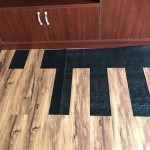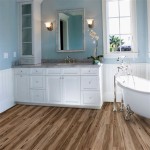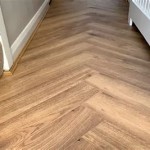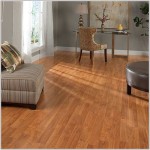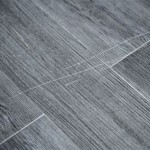Understanding Waterproof Vinyl Plank Flooring
Waterproof vinyl plank flooring has emerged as a popular choice for both residential and commercial spaces, prized for its durability, aesthetic appeal, and, most importantly, its resistance to water damage. Understanding the properties and benefits of this flooring option is crucial for making informed decisions about interior design and long-term maintenance.
Unlike traditional hardwood or laminate flooring, waterproof vinyl plank flooring is engineered to withstand significant moisture exposure without warping, swelling, or developing mold and mildew. This resilience makes it an ideal solution for areas prone to spills, humidity, and leaks, such as bathrooms, kitchens, laundry rooms, and basements.
Construction and Materials
Waterproof vinyl plank flooring is typically constructed using multiple layers, each contributing to its overall performance and durability. A common composition includes the following layers:
Wear Layer: This is the topmost layer, designed to protect the flooring from scratches, scuffs, and stains. The thickness of the wear layer is a primary factor in determining the flooring's lifespan and its suitability for high-traffic areas. Thicker wear layers provide greater protection and are generally recommended for commercial applications.
Vinyl Layer: This layer provides the visual appearance of the flooring, often featuring realistic wood, stone, or tile patterns. Advanced printing technologies allow for highly detailed and textured designs, replicating the look of natural materials with remarkable accuracy. The quality of the vinyl layer directly impacts the aesthetic appeal and the realism of the flooring.
Core Layer: The core layer is the heart of waterproof vinyl plank flooring and is responsible for its waterproof properties. This layer is typically made from a material like wood-plastic composite (WPC) or stone-plastic composite (SPC). WPC cores consist of a blend of wood flour and plastic, offering a balance of comfort and water resistance. SPC cores, on the other hand, are made from a blend of limestone and plastic, providing superior rigidity and dimensional stability. SPC cores are generally considered more resistant to indentations and temperature fluctuations.
Backing Layer: The backing layer provides additional support and cushioning. It also helps to absorb sound and reduce impact noise. Some waterproof vinyl plank flooring products come with an attached underlayment, further enhancing sound insulation and providing a softer feel underfoot.
The specific composition and thickness of each layer can vary depending on the manufacturer and the flooring's intended use. Examining the product specifications carefully is essential to ensure that the flooring meets the specific requirements of the installation environment.
Benefits of Waterproof Vinyl Plank Flooring
The advantages of waterproof vinyl plank flooring extend beyond its primary resistance to water. Its diverse benefits make it a compelling choice for a wide range of applications.
Water Resistance: As the name implies, the primary benefit is its ability to withstand water exposure. Unlike other flooring options, waterproof vinyl plank flooring will not absorb water, preventing swelling, warping, and the growth of mold and mildew. This makes it ideal for bathrooms, kitchens, and basements where moisture is a common concern.
Durability: The multi-layer construction, particularly the wear layer, provides excellent resistance to scratches, dents, and stains. This durability makes it suitable for high-traffic areas and households with children and pets. The longevity of waterproof vinyl plank flooring is significantly greater than that of many other flooring options, making it a cost-effective long-term investment.
Ease of Maintenance: Waterproof vinyl plank flooring is exceptionally easy to clean and maintain. Regular sweeping or vacuuming is sufficient to remove loose dirt and debris. For more thorough cleaning, a damp mop with a mild detergent solution can be used. The non-porous surface prevents the absorption of spills and stains, making cleanup quick and effortless. Avoid using abrasive cleaners or harsh chemicals, as these can damage the wear layer.
Comfort: While not as soft as carpet, waterproof vinyl plank flooring offers a more comfortable feel underfoot than hard surfaces like tile or concrete. The core layer and optional attached underlayment provide cushioning and reduce impact noise. This added comfort can be particularly beneficial in areas where people spend a lot of time standing, such as kitchens.
Aesthetic Appeal: Advances in printing technology have allowed waterproof vinyl plank flooring to replicate the look of natural materials with remarkable realism. Available in a wide range of colors, patterns, and textures, it can mimic the appearance of wood, stone, and tile, providing numerous design options to suit various aesthetic preferences. The realistic visuals and textured surfaces contribute to the overall ambiance and value of the space.
Ease of Installation: Many waterproof vinyl plank flooring products feature click-lock installation systems, making them relatively easy to install as a DIY project. These systems allow the planks to interlock seamlessly without the need for glue or nails. This ease of installation can save on professional installation costs and allows for quicker project completion. However, proper subfloor preparation is essential to ensure a level and stable surface for the flooring.
Types of Waterproof Vinyl Plank Flooring
While all waterproof vinyl plank flooring shares the common characteristic of water resistance, there are variations in construction, materials, and installation methods. Understanding these differences is crucial for choosing the right type of flooring for a specific application.
Luxury Vinyl Plank (LVP): LVP is a broad category that encompasses waterproof vinyl plank flooring. It is typically thicker and more durable than standard vinyl flooring, offering enhanced comfort and realism. LVP often features more intricate designs and textures, mimicking the look of natural materials with greater accuracy.
Wood-Plastic Composite (WPC): WPC flooring features a core layer made from a blend of wood flour and plastic. This core provides a balance of comfort and water resistance. WPC is generally softer and quieter underfoot than SPC, making it a good choice for residential applications where comfort is a priority. However, it may be more susceptible to indentations than SPC.
Stone-Plastic Composite (SPC): SPC flooring features a core layer made from a blend of limestone and plastic. This core provides superior rigidity and dimensional stability. SPC is more resistant to indentations and temperature fluctuations than WPC, making it a good choice for commercial applications and areas with high traffic or temperature variations. SPC is also generally more water resistant than WPC.
Rigid Core Vinyl Plank: This type of flooring refers to vinyl planks with a rigid core, which can be either WPC or SPC. The term emphasizes the flooring's stability and resistance to bending or warping. Rigid core vinyl plank is often used in areas where the subfloor may not be perfectly level.
Click-Lock vs. Glue-Down: Waterproof vinyl plank flooring can be installed using either a click-lock system or a glue-down method. Click-lock systems are easier for DIY installation, while glue-down installations provide a more permanent and secure bond. Glue-down installations are often preferred in commercial settings or areas with heavy traffic.
The choice between these types depends on various factors, including budget, traffic levels, subfloor conditions, and aesthetic preferences. Consulting with a flooring professional can help determine the most suitable option for a specific project.
Factors to Consider When Choosing Waterproof Vinyl Plank Flooring
Selecting the right waterproof vinyl plank flooring requires careful consideration of several key factors. These considerations ensure that the chosen flooring meets the specific needs and requirements of the installation environment.
Wear Layer Thickness: The wear layer is the primary determinant of the flooring's durability and resistance to scratches and stains. Thicker wear layers provide greater protection and are recommended for high-traffic areas and commercial applications. A wear layer of at least 20 mil is generally recommended for commercial use, while a wear layer of 12 mil or more is suitable for residential use.
Core Material: The choice between WPC and SPC cores depends on the desired balance of comfort, durability, and water resistance. WPC cores offer greater comfort, while SPC cores provide superior rigidity and resistance to indentations. Consider the specific needs of the installation environment when making this decision.
Installation Method: Click-lock systems are easier for DIY installation, while glue-down installations provide a more permanent and secure bond. Consider the complexity of the installation, the subfloor conditions, and the level of traffic in the area when choosing the installation method.
Subfloor Preparation: Proper subfloor preparation is essential to ensure a level and stable surface for the flooring. The subfloor should be clean, dry, and free of any imperfections. Uneven or damaged subfloors can lead to problems with the installation and reduce the lifespan of the flooring.
Budget: Waterproof vinyl plank flooring is available in a wide range of price points. Consider the budget constraints and prioritize the features that are most important for the specific application. Investing in higher-quality flooring can often result in long-term cost savings due to its increased durability and longevity.
Aesthetic Preferences: Waterproof vinyl plank flooring is available in a wide range of colors, patterns, and textures. Consider the overall design aesthetic of the space and choose flooring that complements the existing decor. Samples should be viewed in person to accurately assess the color and texture of the flooring.
Manufacturer Reputation: Choosing a reputable manufacturer ensures that the flooring is made from high-quality materials and meets industry standards. Research different manufacturers and read reviews to assess their reputation and product quality. Check for warranties and guarantees that protect against defects and premature wear.

Is Vinyl Plank Flooring Waterproof Twenty Oak

Renature By Coreluxe 5mm W Pad Royal Hampton Hickory Waterproof Rigid Vinyl Plank Flooring 6 81 In Wide X 51 Long Ll

Is Vinyl Plank Flooring Waterproof Twenty Oak

Usfloors Coretec Plus 7 Wpc Engineered Vinyl Flooring Planks

The Best Waterproof Flooring Options Inc

What S Luxury Vinyl Flooring And Is It Waterproof America

Is Vinyl Plank Flooring Waterproof Twenty Oak

Coreluxe 4mm W Pad Midtown Oak Waterproof Rigid Vinyl Plank Flooring 6 In Wide X 36 Long Ll

Is Vinyl Plank Flooring Waterproof Leader Floors Blog

Hydro Vinyl 7 Waterproof Plank
Related Posts


